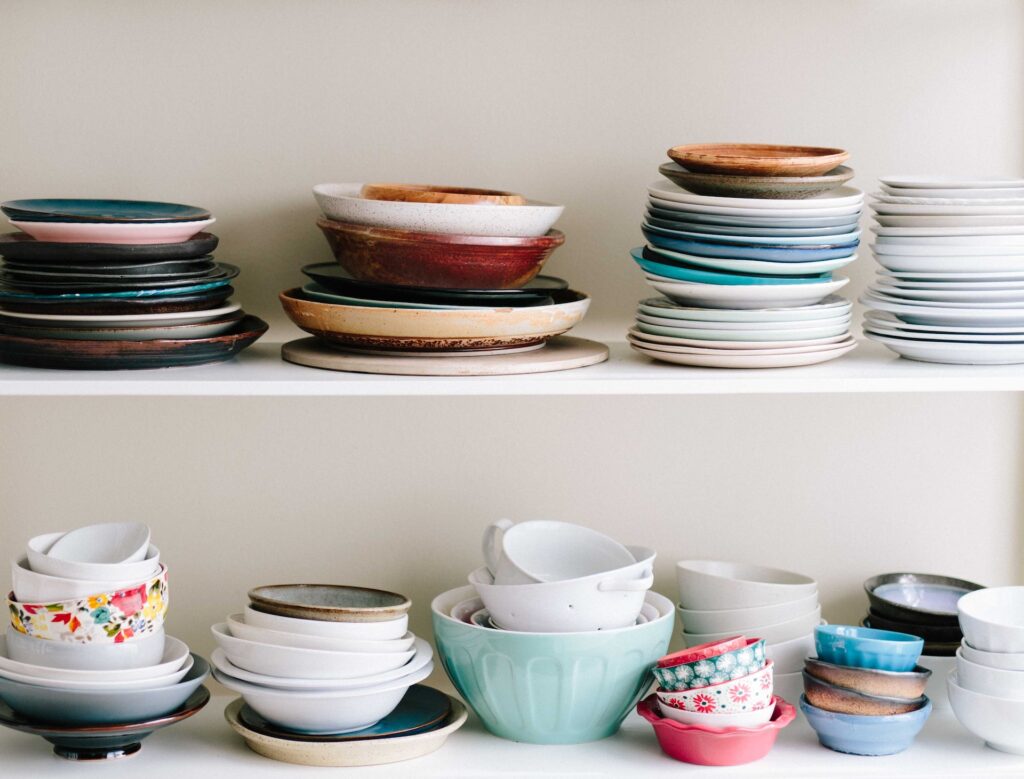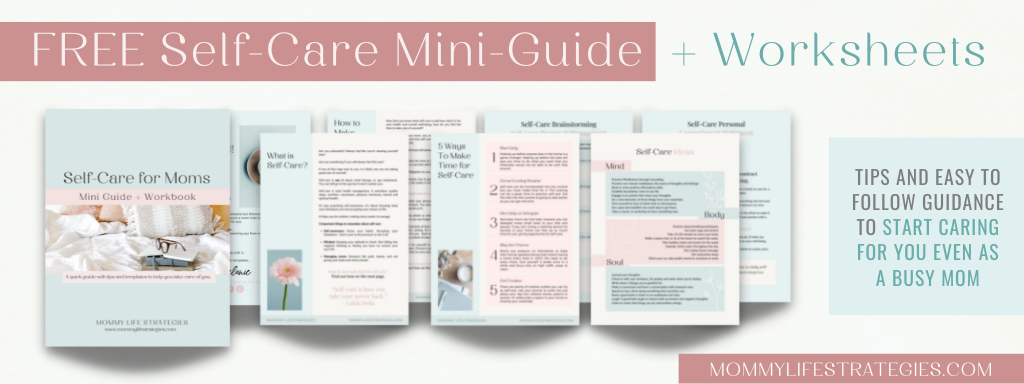
Being a perfectionist mom can be viewed as a positive trait. You’re seen as driven, and results-focused.
Are you a mom who wants to strive for excellence? Most moms want to identify with this. There’s nothing wrong with striving to be better.
It becomes a problem when you strive at the expense of your health and well-being. Those around you are affected by this too.
If you’re hanging on to the perfectionist mom identity in hopes to be a better mom, be careful. If not, you could be limiting yourself and not know it.
Do you struggle to make progress because everything needs to be “just right” first?
Do you let staged images and highlight reels ruin your happiness and doubt your success?
Do you get anxious at the thought of not being able to do a task perfectly?
When you’re a perfectionist mom, you’re torn. You want to give 110% every day.
You want to succeed at everything in life and feel intense pressure to do it all. You don’t want to disappoint anyone or yourself, but you know deep down you can’t do it all.
How far does your perfectionism go? Keep reading to find out.
What is perfectionism?
You probably have an idea of what it is already but just in case. Perfectionism is a trait where you place a very high standard on yourself or others.
There are even three different types.
- 1)A perception of unrealistic expectations from others, 2) on others or 3) on yourself.
Do you feel that the people around you expect you to be perfect? Then you feel external pressure (societal) to do no wrong.
Do you expect others to have the same unrealistic standards as you? Then you place an unreasonably high bar on others.
Or do you expect them of yourself? You are putting pressure on yourself.
For simplicity, I’ll divide it into Healthy versus Unhealthy Perfectionism (also called Adaptive and Maladaptive perfectionism).
Both have high personal standards and want to be better but here’s the difference:
Healthy perfectionist traits (Adaptive)
- They’re punctual and are committed to their routines.
- They know their strengths and weaknesses. They laser focus only on what matters.
- They want to overcome obstacles but never at the expense of their health.
- They are high achievers.
Unhealthy perfectionist traits (Maladaptive)
- They believe they’re never good enough.
- They obsess about doing it perfectly. Preoccupation with image in the eyes of others.
- They are very judgmental of others.
- They procrastinate.
- They set an unrealistically high bar and will risk their health to reach it.
- They need to be in control of everything in life (you can control a lot of things but not everything).
I will get into more specific traits in a moment and want to emphasize that aiming for high standards or wanting to be better is NOT unhealthy.
Setting ambitious goals, being disciplined, being consistently organized, or putting effort into your physical appearance does not make you an unhealthy perfectionist.
If you see similar traits on the unhealthy perfectionist side, I’ll talk about how perfectionism can affect your life up next.
I'm a recovering perfectionist and an aspiring "good-enoughist".
Brene Brown
How perfectionism affects you
Poor Self-esteem
How you view yourself when you’re a perfectionist is often negative, and it diminishes confidence.
If you feel what you do is never good enough, you will never have good self-esteem. It’s why embracing failure and viewing making mistakes as a way to grow, is so important.
If you’re setting an extremely high bar, you will always question your competence as a mom.
Procrastination
Procrastination is normal. But, if you’re a perfectionist, that procrastination will be far worse.
Procrastination typically comes from a place of fear, a fear of failure.
Obsessing over making a mistake or revealing your flaws can cause you to dwell on a task or avoid it altogether.
Do you struggle to make progress? This might be one big reason why.
If you’re a mom that thinks about how “just right” it needs to be before you even start, then you are certainly procrastinating out of fear of being less than perfect.
Perfectionism becomes a badge of honor with you playing the part of the suffering hero.
David D. Burns
Stress
Anxiety is common in moms with perfectionist tendencies. You’re on edge with worry about making mistakes or being flawed.
You are more likely to be in fight or flight mode too. A stress response is caused by your perfectionism and it’s hard to break free from.
Pessimism
When things don’t go your way, you feel bad, but you get over it eventually. You will struggle to get over it.
You will be stuck ruminating about it making you habitually dissatisfied.
Pessimism will hover over you anytime you’re challenged to do something you aren’t confident you can do.
The problem with pessimism is that it robs you of opportunity. You will view challenges as bad instead of a learning experience. This is incredibly draining, and you know how energy intensive being a mom already is.
Pessimism
Even considering external pressure, much of your expectations to do no wrong as a mom, stems from a mindset you created.
A negative mindset keeps you in a cycle of “never good enough”. The messages you communicate to yourself as an unhealthy perfectionist never cease.
What messages do you send yourself when you make a mistake?
What goes on in your mind when another mom outshines you in an area you want to excel in?
Negative self-talk makes you believe that you can’t do something or that it’s your fault – whatever your inner dialogue is telling you. It can ruin motivation and lead to something more serious like depression.
Self-awareness goes a long way to help beat a negative mindset. It doesn’t magically go away the instant you are aware of it, you do still need to take action on it.
Replace the negative words or phrases you frequently tell yourself with words of self-compassion.
Example: “ I hate this…”, “I’m terrible at this…” to “ This is a challenge…” “I’ll do my best…”
Many people think of perfectionism as striving to be your best, but it is not about self-improvement; it’s about earning approval and acceptance.
Brene Brown
Limits your potential
Being a perfectionist might appear to push you to reach your potential. It turns out that it limits you far more than it helps you succeed.
Procrastination, lack of confidence, self-esteem, and a negative mindset get in the way of reaching your potential.
How will you achieve something of value to you if you are preoccupied with perfection?
You’re here to educate yourself and make a positive change. You are capable and your perfectionism doesn’t define you.
So far, I’ve covered what perfectionism is and what the healthy versus unhealthy forms are. What are the glaring signs you’re a perfectionist? Here they are…
8 Signs you’re a perfectionist mom
1.You judge and fear judgement
You judge other moms – a lot. You fear being judged too. It’s common for perfectionist mothers to seek approval because being a mother is a hard job, we want to be sure we’re doing it right.
We are all human and we all pass judgments to a degree. A perfectionist mom on the other hand will be quick to criticize and point out the flaws of other moms. A judgy mom will be uncomfortable with moms who don’t accede to their own choices.
Does it bother you when you see other moms give their kids fast food?
Do you click your tongue when you see a mom give their kids a phone or tablet because you believe no screen time is best for kids?
Do you think other moms are lazy if their home isn’t tidy?
You need to be honest with yourself. If you say yes to any of these, it’s likely you are judgmental.
Try this: Know your triggers. Being judgmental is a defense mechanism.
How you feel about yourself can project onto others.
Practice self-awareness. Keeping tabs on the times you are judgmental and identifying your triggers is a great start to preventing excessive judging.
Perfectionism is used by many people as a shield to protect against the pain of blame, judgment or shame.
Brene Brown
2.Constantly Compare and Compete
Comparing and in some cases competing with other moms can be a sign of insecurity. We live in a world immersed in social media highlight reels and incredible success stories we can only dream of achieving.
We see more finished product than the process. So those transformation stories you follow are the polished final product.
You don’t see what the person sacrificed to get there, you don’t know if they are still happy or struggling with the new change. You don’t see the mistakes they had to make to get there.
Comparison traps and unhealthy competition with other moms hurt not just you but it breaks the trust within the community of moms.
How can moms confide in each other when it’s a game of who’s a better mom?
Would you feel comfortable confiding in a mom who’s always judgmental of herself and others?
It also perpetuates the problem of grooming new moms to think it’s the norm to appear to have it together – all the time. Let’s stop the unhealthy comparison and competition.
Try this: Practice self-compassion and compassion for others. You know how hard it is to achieve life balance as a mom, empathize and help out a fellow mom when you can.
Ask yourself important questions to stop comparing yourself.
- What are my strengths?
- What are my values?
- What matters most to me right now?
Keep your answers and read them when you catch yourself comparing or when you feel that you have to prove yourself.
Another benefit of self-compassion-treating yourself with kindness and understanding is that it can help you manage procrastination too.
You are less likely to fall into a negative cycle of beating yourself up because you avoided a task leading you to procrastination.
Self-compassion is powerful. Make it an everyday practice.

3.Making mistakes terrifies you
Failure is a big deal for perfectionist moms and it’s understandable. Society expects a lot of moms, and it can feel like all eyes are on you, watching every move you make.
Articles online, pamphlets at the doctor’s office, the parenting magazines all set high expectations of mothers. Many are full of conflicting information so moms will often doubt themselves.
Because expectations are sky high, making mistakes leads to a strong sense of shame and guilt. When parenting and being a mom, there is no one right way to do it. There will always be someone to tell you that to be a great mom you have to x, y, or z.
Take it with a grain of salt. Trust your intuition and if you make a mistake, remind yourself that mistakes help you learn and grow and that it’s a very human thing to do. We’re not machines.
Try this: Normalize making mistakes. When you start to feel anxiety about something you fear doing wrong or are uncertain of, acknowledge it and view it as a learning experience.
It won’t be easy to just shake off insecurities, but the daily practice is going to make a difference over time.
4.You procrastinate
You would think that a perfectionist mom would shine at finishing tasks. Not so much. Procrastination is the hallmark of perfectionism.
When faced with a complex task, do you happily accept and embrace it? Are you at ease knowing there will be obstacles and a chance for failure?
You know how scary it is to make mistakes. A Fear of failure and/or revealing your flaws can make finishing tasks extremely difficult. You might even avoid it altogether.
You attempt a challenging task, you get anxious, then you pace and maybe get a snack. While snacking you notice something else you feel needs attention, so you do that thing.
That one thing leads to another thing and to another thing. It goes on and the first task is left behind.
Is it difficult for you to delegate tasks at home or at work? Why is delegating so difficult for you?
It might be a sense of responsibility to do all the things.
You worry consequences will fall on you if work doesn’t get done to what you perceive to be the ideal standard.
You might feel obligated to take on more work and others might hand it over to you because you’ve been volunteering (whether you want to or not).
House isn’t clean to your standards? You’ll probably deep clean from top to bottom and be bitter about it too.
Can’t trust people at work to get the job done? You do it all yourself because you fear they will mess up and you look bad.
It is a heavy burden to carry when you feel this way. It’s no wonder moms experience burnout.
Try this: If getting started on a task creates anxiety, do small tasks you enjoy or don’t overthink about.
Beware the to-do list. Perfectionists love and fear it. Instead of an intimidatingly long list, opt for focusing on your top 1-3 priorities. Forces you to narrow down to what matters instead of needing to do all the things.
Remember you are not lazy or incompetent if you make a mistake or don’t accomplish a huge list of tasks every day.
Your insecurities are in the driver’s seat, controlling your output. Less than perfect is normal and okay.
Another useful way to beat procrastination – use the Pomodoro technique to keep track of time.
Worrying is such a time waster, working through a task(s) in small increments of time can help you fight procrastination. Learn more about it here.

Be not angry that you cannot make others as you wish them to be, since you cannot make yourself as you wish to be.
Thomas a Kempis
5. Always dissatisfied
It’s a paradox – perfectionists are supposedly high achievers but struggle with success. Why? They’re inflexible. It’s hard to be content in life when you’re inflexible.
Healthy high achievers are flexible and focused on doing their best. When they don’t do their best, they take notes, move on, and try again. They don’t have baggage.
Do you deny yourself happiness when you don’t achieve something? Have you ever said to yourself you will be satisfied and happy in your life IF…(achieve goal)?
Denying yourself happiness because you haven’t reached a goal is a surefire way to be unhappy.
Unless you suffer from a mental illness, you can control how you feel. There needs to be genuine reasons to be unhappy.
Being unhappy because your home doesn’t look like it belongs on a magazine cover. Or that you can’t dominate your life to an extreme standard are not genuine reasons to be unhappy.
Let’s face it too, everything seems harder than it is when you’re unhappy. Your frame of mind will make life difficult and therefore you will always be dissatisfied.
Here are some small ways you can bring happiness in your life and start feeling good again.
Try this: Do things that bring a smile to your face. Every day, do something that brings you joy.
One positive action leads to another. Enjoy the small pleasures. A latte with a friend or planting flowers in a garden are a couple of examples to bring joy to life. Make a small list of meaningful activities you enjoy and aim to do at least one every day.
Determine what your needs are. It could be that you’re not meeting a need and because mom life can be chaotic, you haven’t had the time to address those needs.
Practice gratitude. Write one sentence in the morning or evening, about what you are grateful for. Read it aloud after you write it.
6. All or nothing mindset
When you have an all-or-nothing mindset, you don’t give yourself a chance. It’s the attitude that if you can’t do it that one perfect way or right way, you’re done.
The problem with fixating on only a perfect way to do something is that you limit yourself. You don’t get the opportunity to learn and succeed.
All-in is different from all or nothing. All-in is taking the leap into the unknown and willing to learn along the way without unrealistic expectations of the outcome.
All or nothing is black-and-white thinking. “If I don’t get the outcome I want, it’s not going to happen.” “If I can’t get it right, I won’t do it at all.”
Do you often say “I should” or “I shouldn’t” about doing something? This falls into the all-or-nothing mindset too. This mindset diminishes self-esteem and confidence because you’re already doubting yourself.
“I should go to the gym”
“I shouldn’t eat this cookie”
“I should stay up late to deep clean the house.”
“I shouldn’t work because good moms stay home with the kids”
You create a barrier to discovering your potential which is worse than preventing a perceived failure.
A productive way to change this mindset is to track your progress and make note of your small wins. Any progress is still progress. Give yourself recognition for this growth, it still matters.
Try this: Change your language.
How you speak can change your outlook. Try changing it up from “I should or shouldn’t” to…
“I can” and “I won’t”
Why will this work? It forces you to focus on what you CAN do instead of what you can’t.
“I can do a quick sweep of the counter” is much better than “I should clean the kitchen and reorganize the cupboards.”
Messes are going to bother you whether you can do something about them or not. Best to focus on what you can do right now.
When you say “I won’t” do something, you’re making a choice. The “I shouldn’t..” language is not a choice. It’s a language that keeps you in limbo. You haven’t made a choice, you’re just dwelling on it.
It’s ok to draw a line that you won’t do something. It’s ok to pass on something not worth your energy or is draining you of energy.

7. You have a skewed view of motherhood
A perfect mother doesn’t exist but in the mind of a perfectionist mom, it does. Most moms have an ideal image of motherhood but at some point, come to terms with how imperfect it is.
Moms face the problem of exposure to unrealistic images and messages of the motherhood experience. Social media contributes to this problem.
Social media has its benefits like connecting people and sharing inspiration. Unfortunately, the negative messages can outweigh the positive.
Moms can be selective and intentional when using social media. Perfectionist or not, social media can destroy a confident mom fast if they’re not careful.
Manage your online and social media channels regularly. Filter out anything that would cause you to doubt yourself when you were confident about your decisions before.
Online mom groups can be useful, allowing you to share your experiences and build friendships. But, sometimes it’s not so friendly and if you have perfectionist tendencies it will trigger those behaviors.
Raise your hand if you’ve seen these relentless arguments between mothers…Sahms versus working moms – Who’s a better mom? Who’s a better example for their kids?
If an online community is super judgy, causes you to doubt your choices and triggers your perfectionism worse, it’s best to move on. Protect your time and energy.
Try this: Adjust and filter your social media feeds. Go through all your online groups and forums, stick with the ones that are truly useful, and don’t elicit negativity.
Seek out healthy examples of motherhood. Read inspirational and honest stories shared by other moms. They will help you accept and embrace the messiness that motherhood can bring.
Find a mentor or role model that inspires you. Is there a successful yet imperfect mom who you would like to lean on?
8.Take everything personally
When you have the weight of perfectionism on your shoulders, you are on edge. It can feel like your choices and/or your capabilities are always questioned.
Do you get defensive when someone offers you feedback?
Do you get defensive at even the slightest suggestion?
Do you feel that you need to defend yourself all the time?
Receiving feedback and criticism is scary for most people. When you’re a perfectionist, it can feel like an attack on your self-image. Fear of rejection and disapproval is intense in a perfectionist.
Criticism is good if the intention is to help make improvements and provide solutions.
Here’s the difference between constructive criticism and non-constructive criticism.
Constructive criticism: Focuses on the behavior not the person. They provide criticism that’s relevant and current; they do not bring up the past. The criticism is valuable and specific.
Non-Constructive criticism: Focuses on attacking the person instead of the problem.
Negative criticism is irrelevant, usually vague with no suggestions for possible solutions. Sometimes it’s a power play, using criticism to dictate what people should do or cannot do.
Try this: The best way to reduce defensiveness is to build resilience.
Resilience is key to helping you manage life challenges and is especially helpful when making mistakes. It can help you adapt to setbacks and not dwell on mistakes.
If you receive feedback or criticism, take a pause so you don’t react and jump to defending yourself.
Ask questions for clarification. Asking questions to narrow down what the problem is can rule out whether it’s constructive or non-constructive.
Embrace doing less than 100%
You are human. Everyone makes mistakes and everyone has flaws.
If you are swayed by highlight reels, remember these are small snippets in a person’s life and it doesn’t tell the whole story.
Mistakes are inevitable, and so is uncertainty. This is a reality for every mother so don’t let it hold you back.
Strive to be better, not perfect. Don’t let perfectionism limit your potential.
Life is a learning experience, during the experience give yourself some kindness. Track and reward yourself for the progress you make no matter how small.
Instead of setting unachievable goals, focus on what matters and focus on that.
Practice self-compassion so you have the capacity to be compassionate towards other moms.
Want to know how you can overcome perfectionism? Get the strategies here.

Life Balance for Moms: The Simple Theory You Need To Know

Best Deals on Essentials for Back to School on Amazon

Create a Stress-Free Home with a Family Command Center.

Success in 60 Minutes or Less: Quick Win Tasks for Moms

Capsule Grocery List: Meal Planning Simplified

7 Tips to Reduce the Mental Load as an Overwhelmed Mom
What was your biggest takeaway from this post? Share it in the comments.

